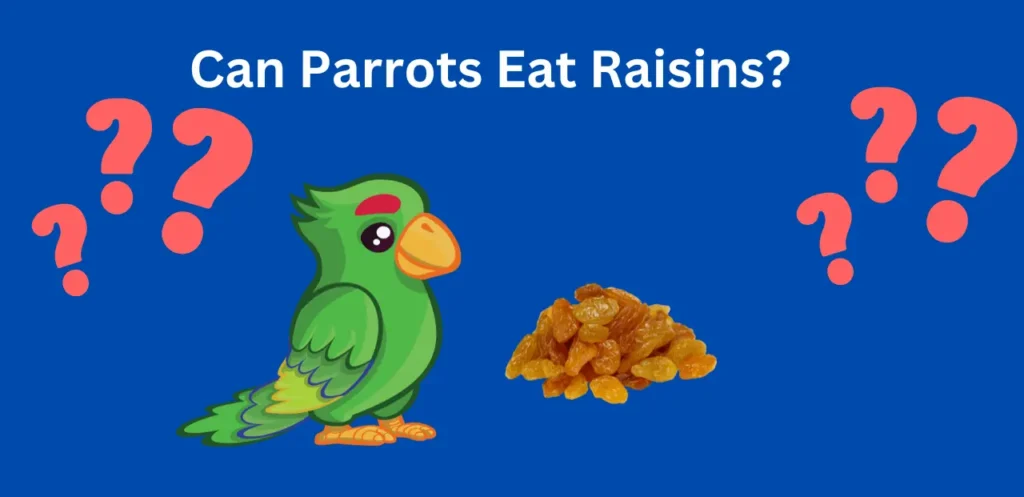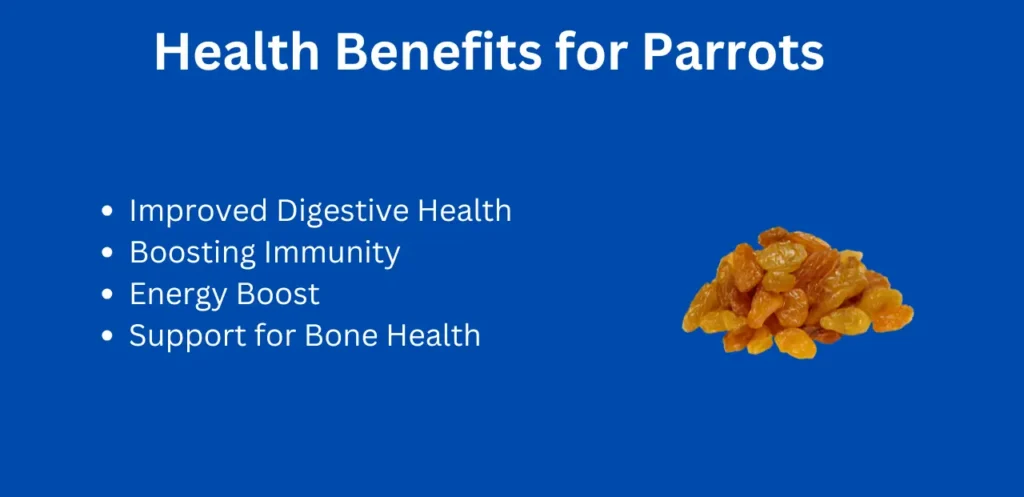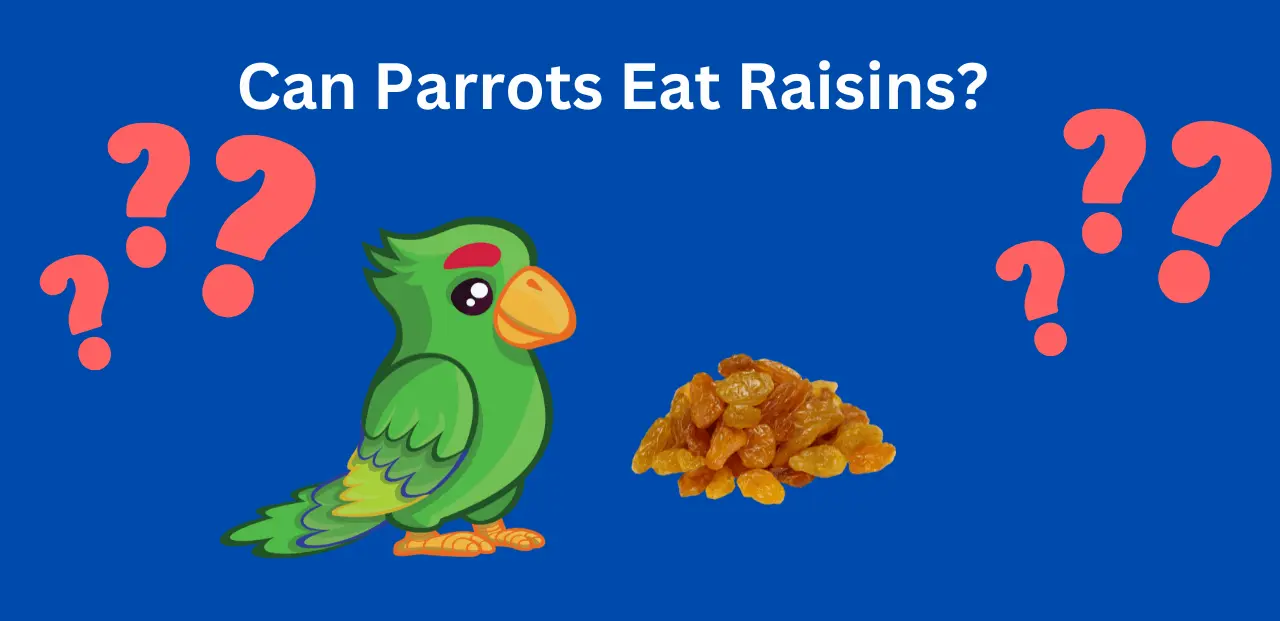It is equally important that you feed your parrot healthy food so as to have long-living, happy parrots. They should provide seeds and pellets, but augmentation of these with fresh fruits and vegetables is equally essential. Raisins are produced from grapes and are a favorite for human consumption, but can parrots eat raisins?

Table of Contents
Are Raisins Safe for Birds or Parrots?
Yes, but with a number of precautions, parrots will not harm them by eating raisins. Raisins are not poisonous to parrots, and therefore they are generally a good snack. But they should be eaten occasionally because they contain high amounts of sugar. In contrast to fresh fruits, raisins are much denser in calories, and sugar because of tyndallization. That being said they can be very useful in your diet and be very delicious, but they should be consumed in moderation.
Nutritional Benefits of Raisins for Parrots
Similar to any other life form parrots require vitamins and minerals and raisins are well known to be packed with these. The above nutrients are energy sources, immune boosters and maintain skin, feathers, and bone and tooth coat.
Natural Sugars: Raisins also contain a relatively high percentage of natural sugars which are fructose and glucose. Despite this having a lot of calorie value the raisins, are supposed to be given sparingly because the excessive sugar content is bad for our parrots and can culminate in obesity diabetes, and other related diseases. However, raisins in very small quantities can be offered to the energetic parrots as a second source of energy which is a quality source of energy.
Fiber: Raisins are packed with dietary fiber that improves the digestion health of the people who consume it. Fiber enables parrots to have well-trained bowels and aids the proper working of the tracts in the gastrointestinal system. Fiber in moderate amounts in a diet is also beneficial to the blood sugar level of a parrot.
Vitamins: Raisins also aid in vitamins such as vitamin C and all types of B vitamins, I mean almost all of B types of vitamins. The benefits of Vitamin C are that it helps the body to prevent being ill through being an antioxidant. It is also involved in collagen synthesis a factor that is critical in skin and feather quality. Other vitamin materials; vitamin B6 (pyridoxine) and vitamin B3 (niacin) are involved in energy production, thinking, and nerves. These vitamins are crucial in ensuring a parrot’s well-being and the amount of energy it has in its body.
Minerals: Besides, raisins are also packed with several minerals K, Fe, Ca, and Mg very vital in the body with several responsibilities. It also has uses in the conservation of fluids in the body, contractions of muscles, and carrying of nerve impulses respectively. It is used in the production of hemoglobin, and in the prevention of anemia besides adding the bones and beak, calcium. This compound has been associated with muscle contractions, the formation of band one and it is an activator of enzymes.
Antioxidants: There are warnings that parrots should not be fed on raisins because they are a source of antioxidants flavenoids and polyphenols that are said to act as protectors of the parrot’s body against radicals. Of these antioxidants, some of them have to be taken since they assist in controlling inflammation and the cell damage that causes lifestyle diseases and the aging process in equal measure.
Health Benefits for Parrots
Energy Boost: Raisins have natural sugars that supply a quick burst of energy in parrots. This can be especially useful when feeding the active or larger parrots that would need more energy to maintain the many activities that such parrots will display. But it does not mean that it has to be consumed in place of the main diet of a parrot which should include fresh fruits and vegetables, as well as high-quality commercial pellets.
Improved Digestive Health: The fiber content in raisins makes them useful in enhancing natural digestion within the parrots. In addition to their positive effects on a parrot’s gastrointestinal system by preventing constipation, raisins may help prevent constipation as well. Fiber also plays a role in nutrient absorption, thus guaranteeing a parrot the maximum nutrients from the food being consumed.
Boosting Immunity: The presence of vitamin C and antioxidants in the raisins plays a big role in strengthening of immunity of the parrot to diseases. Raisins can be something the parrot can be fed on when changing from summer to fall or any other periods in which you feel your parrot will need some extra nourishment.

Support for Bone Health: Calcium and magnesium in raisins help bones and beak which are essential for parrots foods to have. Healthy bones are important in ensuring that birds stay mobile and healthy; a healthy beak is also equally important since birds need to forage and perform natural functions.
How to Safely Feed Raisins to Parrots?
It is safe to feed raisins to parrots if they’re given in moderation and if the goodness outweighs the risks. Raisins contain vitamins, minerals, fiber, and antioxidants, but they contain natural sugar, so they should be administered in limited amounts if one’s pet is a candidate for obesity or diabetes. Here’s how to safely feed raisins to parrots:
- Moderation is Key: Raisins should be administered in minimal quantities and seldom because they are rich in sugars. But because of the sugar, moderation is the key most parrots should only have one or two raisins per day. Feeding your pet extra-sugary treats can cause your pet to pack on the pounds or develop other health issues.
- Choose Unsweetened, Organic Raisins: Use traditional dark-colored raisins with no sugar or preservative addition; however, they may be packed in either water or vinegar. It is an organic raisin because will not contain any pesticide or other dangerous chemicals that can harm your parrot or interfere with its growth in the case that it eats the raisins you gave it.
- Avoid Rasins with Seeds: Do not forget to use seedless raisins. However, grapes should only be given as a treat, and seedless raisins are preferred and necessary because most birds develop an allergy to the seeds once they penetrate their throat. Raisins more or less are simply dried grapes thus they are accompanied by almost all fruits’ attributes least the seed risks.
- Monitor for Allergic Reactions: When adding a new food item into the parrot’s diet observe any reaction, changes in behavior, droppings, or stomach issues. In any case, don’t feed your pet raisins anymore, and consult a veterinarian.
- Balanced Diet: Raisins should be taken together with fresh fruits, vegetables, high-quality pellets, and seeds. These ones should not be used in place for the main food sources however they should be used as supplements to enhance a variety of our parrot’s diets.
Conclusion
Feeding your parrot raisins is not forbidden but it has to be in limit. As much as the raisins contain nutritional benefits they are rich in sugars and should therefore be taken in moderation more of an occasional indulgence rather than a staple food product. From the following tips, you can easily add raisins to your parrot’s diet without causing harm to your parrot.
FAQs
Can birds have dried raisins?
Birds can eat dried raisins, but they simply should not be given too often because raisins are sweet. In this case, it is recommended to purchase free-form sugars, organic raisins that have not undergone an addition of any preservative, and those raisins with no seeds.
Can parrots eat raisins every day?
Yes, parrots can eat raisins but they should not be given on a regular basis because they are sugar-coated. Children should rarely, if ever, be allowed to have raisins as a snack because they are so full of sugar; this is not good for their health as they might develop things like obesity or diabetes. To keep your parrot healthy and happy, the quantities taken must be kept measured to avoid over-feeding your parrot.
Can parrots eat raisin seeds?
Raisin seeds should be avoided in a Parrot diet because most raisins are produced from seedless grapes. However, if you do find dried raisins with seeds, it is advised not to feed them to your parrot because the seeds belonging to grapes are toxic to birds. Only feed your parrot with seedless raisins and those that do not contain any additives to your parrot.
Related Posts

Abubakr is a passionate parrot enthusiast based in Pakistan. He shares his life with his vibrant parrot, Peto, and is dedicated to understanding parrot nutrition, behavior, and training. Through his experiences with Peto, Abubakr aims to gain a deeper insight into the needs and personalities of parrots and to share his knowledge with fellow parrot lovers. With a focus on the nutrition of conures, Abubakr is excited to connect with like-minded individuals and learn from their experiences.
